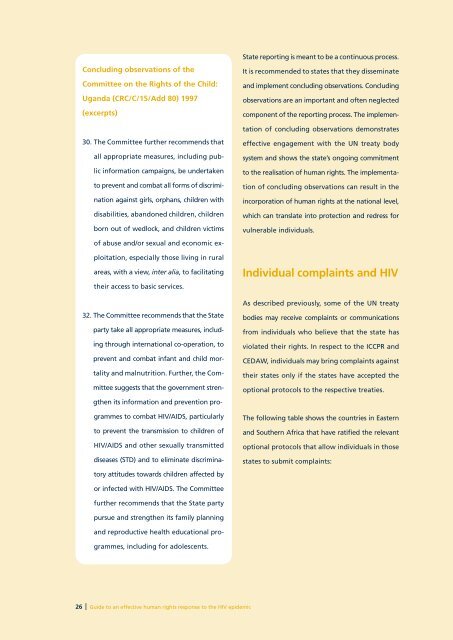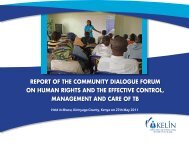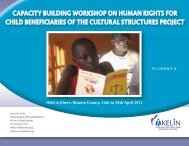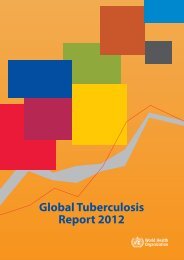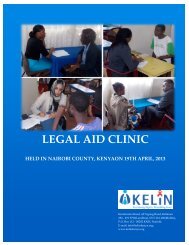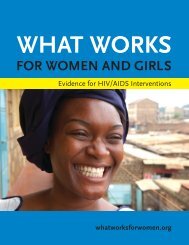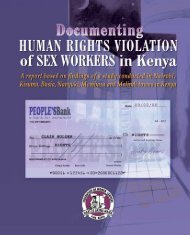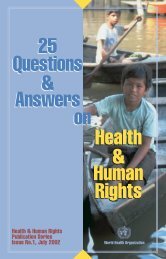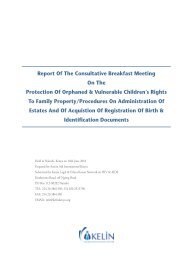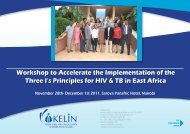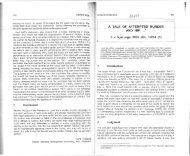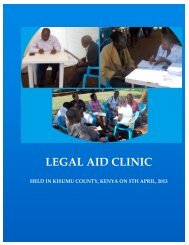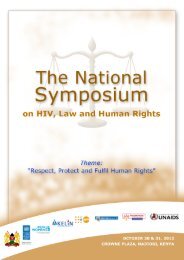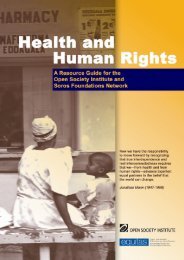Guide to an effective human rights response to the HIV epidemic
Guide to an effective human rights response to the HIV epidemic
Guide to an effective human rights response to the HIV epidemic
You also want an ePaper? Increase the reach of your titles
YUMPU automatically turns print PDFs into web optimized ePapers that Google loves.
Concluding observations of <strong>the</strong><br />
Committee on <strong>the</strong> Rights of <strong>the</strong> Child:<br />
Ug<strong>an</strong>da (CRC/C/15/Add 80) 1997<br />
(excerpts)<br />
State reporting is me<strong>an</strong>t <strong>to</strong> be a continuous process.<br />
It is recommended <strong>to</strong> states that <strong>the</strong>y disseminate<br />
<strong>an</strong>d implement concluding observations. Concluding<br />
observations are <strong>an</strong> import<strong>an</strong>t <strong>an</strong>d often neglected<br />
component of <strong>the</strong> reporting process. The implementation<br />
of concluding observations demonstrates<br />
30. The Committee fur<strong>the</strong>r recommends that<br />
all appropriate measures, including public<br />
information campaigns, be undertaken<br />
<strong>to</strong> prevent <strong>an</strong>d combat all forms of discrimination<br />
against girls, orph<strong>an</strong>s, children with<br />
disabilities, ab<strong>an</strong>doned children, children<br />
born out of wedlock, <strong>an</strong>d children victims<br />
of abuse <strong>an</strong>d/or sexual <strong>an</strong>d economic exploitation,<br />
especially those living in rural<br />
areas, with a view, inter alia, <strong>to</strong> facilitating<br />
<strong>the</strong>ir access <strong>to</strong> basic services.<br />
32. The Committee recommends that <strong>the</strong> State<br />
party take all appropriate measures, including<br />
through international co-operation, <strong>to</strong><br />
prevent <strong>an</strong>d combat inf<strong>an</strong>t <strong>an</strong>d child mortality<br />
<strong>an</strong>d malnutrition. Fur<strong>the</strong>r, <strong>the</strong> Committee<br />
suggests that <strong>the</strong> government streng<strong>the</strong>n<br />
its information <strong>an</strong>d prevention programmes<br />
<strong>to</strong> combat <strong>HIV</strong>/AIDS, particularly<br />
<strong>to</strong> prevent <strong>the</strong> tr<strong>an</strong>smission <strong>to</strong> children of<br />
<strong>HIV</strong>/AIDS <strong>an</strong>d o<strong>the</strong>r sexually tr<strong>an</strong>smitted<br />
diseases (STD) <strong>an</strong>d <strong>to</strong> eliminate discrimina<strong>to</strong>ry<br />
attitudes <strong>to</strong>wards children affected by<br />
<strong>effective</strong> engagement with <strong>the</strong> UN treaty body<br />
system <strong>an</strong>d shows <strong>the</strong> state’s ongoing commitment<br />
<strong>to</strong> <strong>the</strong> realisation of hum<strong>an</strong> <strong>rights</strong>. The implementation<br />
of concluding observations c<strong>an</strong> result in <strong>the</strong><br />
incorporation of hum<strong>an</strong> <strong>rights</strong> at <strong>the</strong> national level,<br />
which c<strong>an</strong> tr<strong>an</strong>slate in<strong>to</strong> protection <strong>an</strong>d redress for<br />
vulnerable individuals.<br />
Individual complaints <strong>an</strong>d <strong>HIV</strong><br />
As described previously, some of <strong>the</strong> UN treaty<br />
bodies may receive complaints or communications<br />
from individuals who believe that <strong>the</strong> state has<br />
violated <strong>the</strong>ir <strong>rights</strong>. In respect <strong>to</strong> <strong>the</strong> ICCPR <strong>an</strong>d<br />
CEDAW, individuals may bring complaints against<br />
<strong>the</strong>ir states only if <strong>the</strong> states have accepted <strong>the</strong><br />
optional pro<strong>to</strong>cols <strong>to</strong> <strong>the</strong> respective treaties.<br />
The following table shows <strong>the</strong> countries in Eastern<br />
<strong>an</strong>d Sou<strong>the</strong>rn Africa that have ratified <strong>the</strong> relev<strong>an</strong>t<br />
optional pro<strong>to</strong>cols that allow individuals in those<br />
states <strong>to</strong> submit complaints:<br />
or infected with <strong>HIV</strong>/AIDS. The Committee<br />
fur<strong>the</strong>r recommends that <strong>the</strong> State party<br />
pursue <strong>an</strong>d streng<strong>the</strong>n its family pl<strong>an</strong>ning<br />
<strong>an</strong>d reproductive health educational programmes,<br />
including for adolescents.<br />
26 | <strong>Guide</strong> <strong>to</strong> <strong>an</strong> <strong>effective</strong> hum<strong>an</strong> <strong>rights</strong> <strong>response</strong> <strong>to</strong> <strong>the</strong> <strong>HIV</strong> <strong>epidemic</strong>


